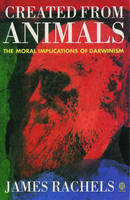
Created from Animals
The Moral Implications of Darwinism
Seiten
1991
Oxford University Press (Verlag)
978-0-19-286129-0 (ISBN)
Oxford University Press (Verlag)
978-0-19-286129-0 (ISBN)
An account of the relevance of Darwinism to ethics. The author explains the development of Darwin's ideas, and how natural selection can paradoxically foster altruistic rather than egoistic tendencies, setting out the implications for conventional religion and ethics.
Since the Origin of Species was first published, Darwinism has been attacked for undermining traditional morality. In particular, because it emphasizes the kinship between humans and other animals, Darwinism seems incompatible with the traditional idea of human dignity - that human life has a special value, while other animals may be sacrificed for any purpose that humans choose.
This book argues that Darwinism does undermine the traditional idea of human dignity; however, this is not a reason for rejecting Darwin's outlook. Instead, it is a reason for rejecting human dignity and replacing it with a better moral view, a more enlightened ethic regarding both the value of human life and our treatment of nonhuman animals.
This important book, presenting Darwin's scientific and non-scientific views as one united theory, will stimulate all those interested in evolution, morality, religion, and animal rights to re-examine their views.
Since the Origin of Species was first published, Darwinism has been attacked for undermining traditional morality. In particular, because it emphasizes the kinship between humans and other animals, Darwinism seems incompatible with the traditional idea of human dignity - that human life has a special value, while other animals may be sacrificed for any purpose that humans choose.
This book argues that Darwinism does undermine the traditional idea of human dignity; however, this is not a reason for rejecting Darwin's outlook. Instead, it is a reason for rejecting human dignity and replacing it with a better moral view, a more enlightened ethic regarding both the value of human life and our treatment of nonhuman animals.
This important book, presenting Darwin's scientific and non-scientific views as one united theory, will stimulate all those interested in evolution, morality, religion, and animal rights to re-examine their views.
James Rachels is author of The End of Life (OUP, 1986)
Darwin's discovery; how evolution and ethics might be related; must a Darwinian be sceptical about religion?; how different are humans from other animals?; morality without the idea that humans are special.
| Erscheint lt. Verlag | 23.5.1991 |
|---|---|
| Verlagsort | Oxford |
| Sprache | englisch |
| Maße | 127 x 2503 mm |
| Gewicht | 322 g |
| Themenwelt | Geisteswissenschaften ► Philosophie ► Ethik |
| Studium ► Querschnittsbereiche ► Geschichte / Ethik der Medizin | |
| Naturwissenschaften ► Biologie ► Evolution | |
| ISBN-10 | 0-19-286129-8 / 0192861298 |
| ISBN-13 | 978-0-19-286129-0 / 9780192861290 |
| Zustand | Neuware |
| Informationen gemäß Produktsicherheitsverordnung (GPSR) | |
| Haben Sie eine Frage zum Produkt? |
Mehr entdecken
aus dem Bereich
aus dem Bereich
Die Geschichte eines Weltzentrums der Medizin von 1710 bis zur …
Buch | Softcover (2021)
Lehmanns Media (Verlag)
17,95 €
von der Antike bis zur Gegenwart
Buch | Softcover (2024)
C.H.Beck (Verlag)
12,00 €
Krankheitslehren, Irrwege, Behandlungsformen
Buch | Softcover (2024)
C.H.Beck (Verlag)
39,95 €


